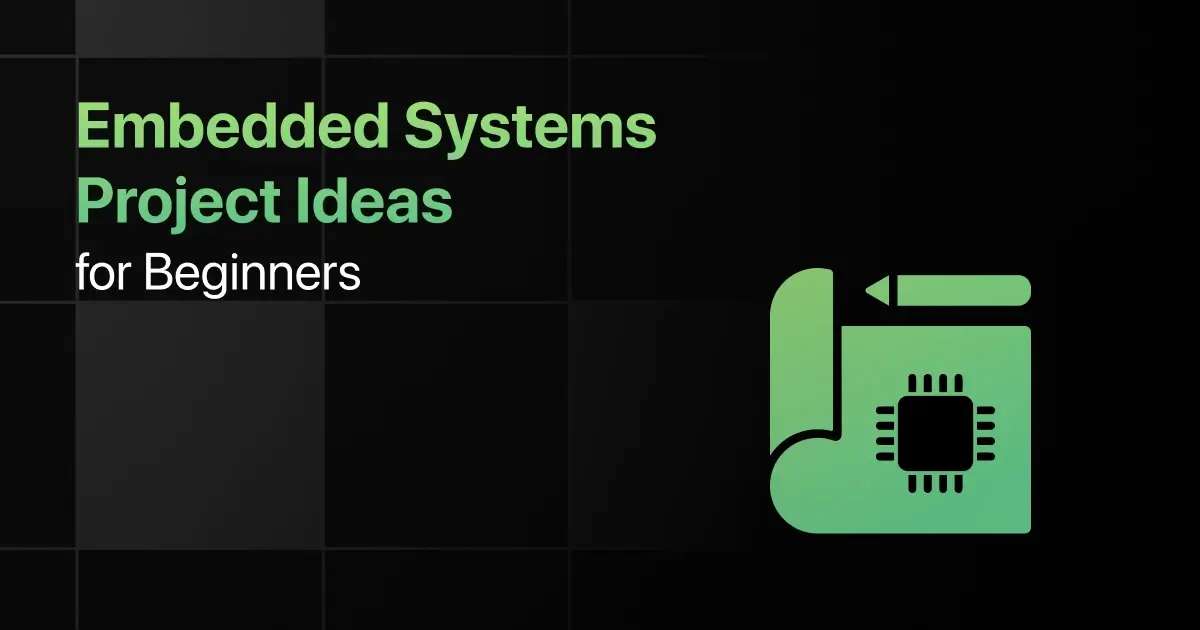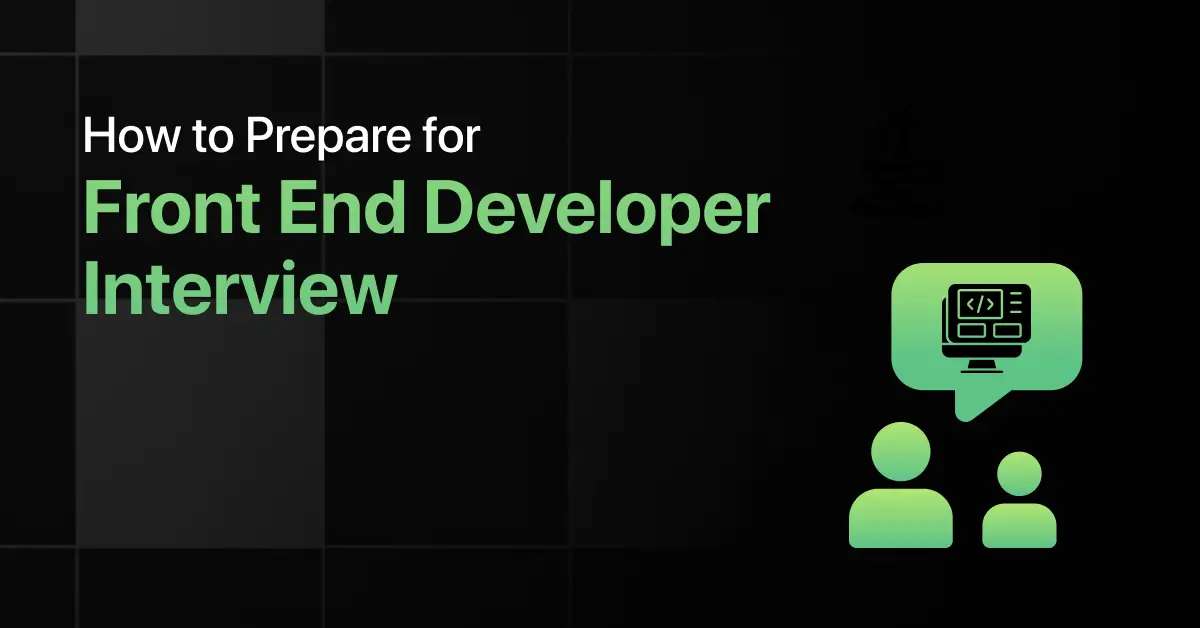Best Embedded Systems Project Ideas for Beginners

Are you interested in practically mastering Embedded Systems? Then you are in the right place.
But there is a huge crowd looking to master this! To stand out among them you need to create a strong portfolio.
You can start creating your unique portfolio by beginning with the below-mentioned Embedded Systems projects for beginners.
10 Beginner-Friendly Embedded Systems Project Ideas – Overview
Here’s an overview of the 10 best embedded systems projects for beginners:
| S.No. | Project Title | Complexity | Estimated Time | Source Code |
|---|---|---|---|---|
| 1 | Biometric Attendance System | Easy | 6 hours | View Code |
| 2 | Home Automation Using IoT | Easy | 6 hours | View Code |
| 3 | Smart Irrigation System | Easy | 5 hours | View Code |
| 4 | LED Display | Easy | 5 hours | View Code |
| 5 | Weather Logger | Easy | 6 hours | View Code |
| 6 | Air Quality Monitoring System | Medium | 8 hours | View Code |
| 7 | Robotic Arm | Medium | 10 hours | View Code |
| 8 | Smart Energy Meter System | Medium | 10 hours | View Code |
| 9 | Gesture Control Robot | Medium | 10 hours | View Code |
| 10 | Vehicle Tracking System | Medium | 10 hours | View Code |
Top 10 Embedded Systems Projects for Beginners
Below are the top 10 embedded systems projects for beginners:
1. Biometric Attendance System
This project involves creating a biometric attendance system using fingerprint or facial recognition.
You will learn about biometric authentication and data logging.
Duration: 6 hours
Project Complexity: Easy
Learning Outcome: Understanding of biometric authentication and real-time data logging
Portfolio Worthiness: Yes
Required Pre-requisites:
- Basic programming skills
- Understanding of biometric sensors
- Basic knowledge of databases
Resources Required:
- Biometric sensor (fingerprint or camera)
- Microcontroller (e.g., Arduino, Raspberry Pi)
- Database for storing attendance data
Real-World Application:
- Automated attendance tracking
- Secure access control systems
2. Home Automation using IoT
This project involves creating a home automation system that controls appliances via IoT.
You will learn about IoT communication protocols and automation.
Duration: 6 hours
Project Complexity: Easy
Learning Outcome: Understanding of IoT protocols and automation techniques
Portfolio Worthiness: Yes
Required Pre-requisites:
- Basic understanding of IoT
- Familiarity with sensors and actuators
- Basic networking knowledge
Resources Required:
- IoT devices (e.g., smart plugs, sensors)
- Microcontroller (e.g., Arduino, Raspberry Pi)
- Smartphone or computer for control
Real-World Application:
- Smart home systems
- Energy efficiency management
3. Smart Irrigation System
This project involves developing an automated irrigation system that waters plants based on soil moisture levels.
You will learn about sensor integration and automation.
Duration: 5 hours
Project Complexity: Easy
Learning Outcome: Understanding of sensor integration and automated control systems
Portfolio Worthiness: Yes
Required Pre-requisites:
- Basic programming skills
- Familiarity with sensors (e.g., soil moisture sensors)
- Basic understanding of microcontrollers
Resources Required:
- Soil moisture sensor
- Microcontroller (e.g., Arduino)
- Water pump
Real-World Application:
- Efficient water management in agriculture
- Smart gardening systems
4. LED Display
This project involves creating a programmable LED display board for displaying messages.
You will learn about LED matrix control and data display techniques.
Duration: 5 hours
Project Complexity: Easy
Learning Outcome: Understanding of LED matrix control and data display
Portfolio Worthiness: Yes
Required Pre-requisites:
- Basic programming skills
- Understanding of LEDs and circuitry
- Basic microcontroller knowledge
Resources Required:
- LED matrix display
- Microcontroller (e.g., Arduino)
- Power supply
Real-World Application:
- Digital signage
- Information display systems
5. Weather Logger
This project involves creating a system to log weather data using various sensors.
You will learn about data collection, storage, and environmental monitoring.
Duration: 6 hours
Project Complexity: Easy
Learning Outcome: Understanding of data logging and environmental monitoring
Portfolio Worthiness: Yes
Required Pre-requisites:
- Basic programming skills
- Familiarity with environmental sensors
- Basic understanding of data storage
Resources Required:
- Weather sensors (e.g., temperature, humidity)
- Microcontroller (e.g., Arduino, Raspberry Pi)
- Storage device (e.g., SD card, cloud storage)
Real-World Application:
- Environmental data logging
- Weather monitoring stations
6. Air Quality Monitoring System
This project involves creating a system to monitor air quality using gas sensors.
You will learn about sensor data collection and environmental health monitoring.
Duration: 8 hours
Project Complexity: Medium
Learning Outcome: Understanding of air quality monitoring and data analysis
Portfolio Worthiness: Yes
Required Pre-requisites:
- Basic programming skills
- Familiarity with gas sensors
- Basic understanding of data visualization
Resources Required:
- Air quality sensors (e.g., MQ-135)
- Microcontroller (e.g., Arduino, Raspberry Pi)
- Display or storage device
Real-World Application:
- Environmental health monitoring
- Smart city applications
7. Robotic Arm
This project involves building and programming a robotic arm for various tasks.
You will learn about robotics, motor control, and automation.
Duration: 10 hours
Project Complexity: Medium
Learning Outcome: Understanding of robotic systems and motor control
Portfolio Worthiness: Yes
Required Pre-requisites:
- Advanced programming skills
- Understanding of motors and servos
- Basic robotics knowledge
Resources Required:
- Robotic arm kit
- Microcontroller (e.g., Arduino, Raspberry Pi)
- Power supply
Real-World Application:
- Automation in manufacturing
- Educational robotics
8. Smart Energy Meter System
This project involves developing a smart energy meter to monitor and manage electricity consumption.
You will learn about energy monitoring and data analytics.
Duration: 10 hours
Project Complexity: Medium
Learning Outcome: Understanding of energy monitoring and usage analytics
Portfolio Worthiness: Yes
Required Pre-requisites:
- Basic programming skills
- Understanding of electricity meters
- Basic knowledge of data analysis
Resources Required:
- Energy meter sensor
- Microcontroller (e.g., Arduino, Raspberry Pi)
- Display or storage device
Real-World Application:
- Home energy management
- Utility monitoring systems
9. Gesture Control Robot
This project involves building a robot that can be controlled using hand gestures.
You will learn about sensor integration, signal processing, and robotics.
Duration: 10 hours
Project Complexity: Medium
Learning Outcome: Understanding of gesture recognition and robotic control
Portfolio Worthiness: Yes
Required Pre-requisites:
- Advanced programming skills
- Understanding of sensors (e.g., accelerometers)
- Basic robotics knowledge
Resources Required:
- Gesture sensors
- Microcontroller (e.g., Arduino, Raspberry Pi)
- Robotic components
Real-World Application:
- Assistive technology
- Innovative control systems
10. Vehicle Tracking System
This project involves creating a system to track vehicle location using GPS and GSM modules.
You will learn about GPS technology and real-time location tracking.
Duration: 10 hours
Project Complexity: Medium
Learning Outcome: Understanding of GPS technology and real-time tracking
Portfolio Worthiness: Yes
Required Pre-requisites:
- Basic programming skills
- Understanding of GPS and GSM modules
- Basic networking knowledge
Resources Required:
- GPS module
- GSM module
- Microcontroller (e.g., Arduino)
Real-World Application:
- Fleet management
- Personal vehicle security
Final Words
Embedded Systems mini projects for beginners can help you build a strong portfolio to ace technical interviews in IoT and hardware.
Based on your experience and understanding of these Embedded Systems projects for beginners, you can develop them to suit your requirements.
Explore More IoT Resources
Explore More Project Ideas
- Python
- Java
- C Programming
- HTML and CSS
- React
- JavaScript
- PHP
- C++
- DBMS
- SQL
- Excel
- Angular
- Node JS
- DSA
- Django
- Power BI
- R Programming
- Operating System
- MongoDB
- React Native
- Golang
- Matlab
- Tableau
- .Net
- Bootstrap
- C#
- Next JS
- Kotlin
- jQuery
- React Redux
- Rust
- Shell Scripting
- Vue JS
- TypeScript
- Swift
- Perl
- Scala
- Figma
- RPA
- UI/UX
- Automation Testing
- Blockchain
- Cloud Computing
- DevOps
- Selenium
- Internet of Things
- Web Development
- Data Science
- Android
- Data Analytics
- Front-End
- Back End
- MERN Stack
- Big Data
- Data Engineering
- Full Stack
- MEAN Stack
- Artificial Intelligence
- Machine Learning
- Arduino
- Cyber Security
- Raspberry Pi
- Spring Boot
- NLP
FAQs
Some easy embedded systems project ideas for beginners are:
- Biometric Attendance System
- LED Display
- Smart Irrigation System
Embedded system projects are important for beginners as they provide hands-on experience with real-world applications and help understand hardware and software integration.
From embedded systems, beginners can learn skills such as programming, circuit design, problem-solving, debugging, and an understanding of microcontrollers and sensors.
A simple biometric attendance system project is recommended for someone with no prior programming experience.
It typically takes 8 hours to complete a beginner-level embedded systems project.
Related Posts


How to Prepare for .Net Interview
Are you preparing for a .NET interview but not sure which topics to prioritize? Many candidates struggle to balance C# fundamentals, …
Warning: Undefined variable $post_id in /var/www/wordpress/wp-content/themes/placementpreparation/template-parts/popup-zenlite.php on line 1050






